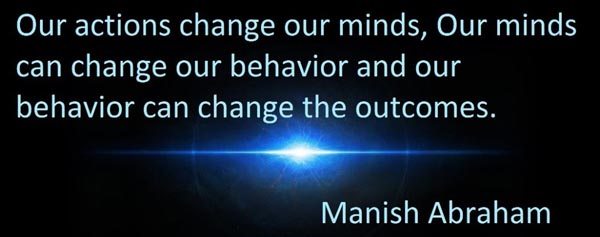Success Advice
10 Signs You Are Addicted To Failure

If you’re searching for the secrets to success, they aren’t hard to find. There are thousands of books, seminars, podcasts, articles, interviews, videos, and courses all dedicated to teaching you how to succeed. And yet even with all of this incredible information available at little to no cost, so many of us continue to live in mediocrity and will never taste success.
The reality is that you can have all the right knowledge, but if you hold on to the wrong beliefs or behaviors, you are more likely to meet with failure than you are with success. Failure is not always a bad thing, as long as you are learning from the mistakes and are correcting your behaviors and actions to reach success. Fortunately there are signs that serve as warnings that you may be on the path to constant failure. By acknowledging these signs, and making changes when necessary, you increase your odds of success dramatically.
Listed below are 10 signs that you’re addicted to constant failure:
How To Stop Failing By Changing Your Behaviors
1. You’re addicted to the approval of others
When it’s time to make an important decision, instead of trusting your logic and intuition, you consult with the people around you first. You value the opinions of others more than you value your own. This emotional addiction to the approval of others stems from your lack of self-confidence, and your desire to please everyone.
Successful people are very particular about whose advice they ask for. They make sure to only consider the opinion of someone who has a track record of success with the issue at hand. They don’t concern themselves with the opinions of anyone and everyone, especially when it comes to issues that those people have little or no experience with. At the end of the day, they do what they feel is right – not what other people convince them to do.
2. You entertain yourself instead of educating yourself
You work a full time job and you might even have a decent career, but you haven’t opened a book since college, and the only extra training you’ve taken was required by your employer. The thought of going to networking events in your industry, reading books, listening to podcasts, or going to seminars to learn new skills and get new ideas is completely foreign to you.
Instead of spending your spare time investing in yourself and your ability to provide more value to the marketplace, you distract yourself with entertainment that adds no real value to your life or your productivity. You watch television often, you always know who won the game, and you can be found in nightclubs regularly.
3. You blame others for your circumstances
You’re not satisfied with where you are in life, but you have a perfect explanation for it. Essentially, none of it is your fault. You blame your boss, your coworkers, your parents, your educators, your childhood, even the economy for your lack of success.
You refuse to take 100% responsibility for your results. You refuse to acknowledge that YOU are in control of your life, and you get to steer yourself in whatever direction you choose.
4. You’re afraid of making mistakes
You’re afraid of failure, so you do whatever you can do avoid making mistakes. You forget that in the real world failure is not good or bad, it is simply feedback. But instead of learning from the valuable feedback that failure provides, you try to avoid it entirely. When you make a mistake, you cover it up and hope no one notices. You also put off making decisions because you’re afraid of making the wrong one. It takes you a long time to finally make a decision, and you change your mind often.
5. You stay in relationships that obviously aren’t working
You have a tendency to date people who bring you more problems than pleasure. You often tolerate behaviors that you know are unacceptable, and because you tolerate them they continue. Maybe you carry unresolved issues from previous relationships into your current one. Maybe you struggle with a low self-image so the standard you have for others isn’t very high. Whatever the case is, you must understand that your choice of spouse has a major impact on your life and success. If the person you’re with now is inhibiting your happiness and success, cut them lose and raise your standards.
6. You’re addicted to drama
Your life is a lot like an episode from a reality TV show. You are rarely on good terms with all of the people around you. You gossip about others often, and surprise surprise, they gossip about you too. The people you spend time with are known for arguing with each other, flirting with each other’s spouses, lying, and generally just causing problems between each other regularly. Instead of disassociating yourself from these types of people, you jump right in and add fuel to the fire. Heck, maybe you’re even the star of the show.
7. You spend time with people who are going nowhere
Jim Rohn, who was considered to be America’s Foremost Business Philosopher, once said that you become the average of the five people you spend the most time with. Unfortunately you spend most of your time with people who do not support or encourage your success. The people around you have no ambitions, no goals, and no concrete plans to improve their life. They seem to think that success is something that happens to other people, but not to them. You sometimes share an ambitious idea with these people, but they are quick to crush it.
Successful people know that the attitudes of the people around them are contagious, so they intentionally surround themselves with people who will encourage them and push them to higher levels. They know that they can’t afford to adopt the beliefs, thoughts, and habits of mediocre people if they are going to continue succeeding.
8. You’re careless with money
You often run out of money before you run out of month. You’re living paycheck to paycheck and you invest nothing for the future. You carry a balance on your credit cards, you take vacations you can’t afford, and you often buy expensive things impulsively. You spend money trying to look successful, but your balance sheet tells a different story. You hardly have any savings. You certainly don’t have a retirement plan. You don’t have any assets that make money for you, and your spending habits are your biggest liability.
You sometimes come close to acknowledging the truth about your situation, but instead of facing it and changing it, you let it continue. Thinking about your finances gives you a headache, and you prefer to avoid the subject entirely.
9. You have dreams (great) but no set goals (not so great)
You often imagine a more desirable version of your life, but instead of working towards making that vision a reality, you settle for your present circumstances. You complain often, but change little. You say you want certain things, but you do nothing to obtain them. You wish for your life to get better, but you make no commitment to improve yourself or your circumstances.
Successful people are driven by clear, specific goals. Their goals are what guide their decisions and their daily activities, and they rarely let a day pass by without doing something to bring them closer to achieving them. Their dreams aren’t something they sleep with at night; their dreams are something they wake up and chase.
10. You think successful people got lucky
The final sign that you’re addicted to failure is you believe that people who are successful got lucky – that they had some sort of advantage that you don’t have. You believe their parents helped them, or they went to the right school, or grew up in the right neighbourhood, or got in at the right time, or knew the right person, etc.
You think success is something that people stumble upon – a “right place at the right time” sort of situation. But the reality is people succeed by being the right person in the right place at the right time. In other words, they work relentlessly to prepare themselves for specific opportunities, and when those opportunities present themselves, they seize them. They don’t sit around waiting for the life they want to fall into their lap. They also typically don’t buy lottery tickets.

Business
Why Smart Entrepreneurs Are Quietly Buying Gold and Silver
When stocks, property, and cash move together, smart business owners turn to one asset that plays by different rules.

You’ve built your business from the ground up. You know what it takes to create value, manage risk, and grow wealth. But here’s something that might surprise you: some of the most successful entrepreneurs are quietly adding physical gold and silver to their portfolios. (more…)
Business
The Simple Security Stack Every Online Business Needs
Most small businesses are exposed online without realising it. This simple protection stack keeps costs low and risks lower.

Running a business online brings speed and reach, but it also brings risk. Data moves fast. Payments travel across borders. Teams log in from homes, cafés, and airports. (more…)
Business
If Your Business Internet Keeps Letting You Down, Read This
From smoother operations to better security, dedicated internet access is quietly powering today’s high-performing businesses.

Today, a dependable internet service is the bedrock for uninterrupted business operations. Many organizations rely on stable online connections for communication, data transfer, and customer interaction. (more…)
Did You Know
How Skilled Migrants Are Building Successful Careers After Moving Countries
Behind every successful skilled migrant career is a mix of resilience, strategy, and navigating systems built for locals.

Moving to a new country for work is exciting, but it can also be unnerving. Skilled migrants leave behind familiar systems, networks, and support to pursue better job opportunities and a better future for their families. (more…)
-

 News2 weeks ago
News2 weeks agoBrandon Willington Builds 7-Figure Business by Ignoring Almost Everything
-

 Health & Fitness3 weeks ago
Health & Fitness3 weeks agoWhat Minimalism Actually Means for Your Wellness Choices
-

 Did You Know3 weeks ago
Did You Know3 weeks agoWhy Most Online Courses Fail and How to Fix Them
-

 Business3 weeks ago
Business3 weeks agoIf Your Business Internet Keeps Letting You Down, Read This
-

 Business1 week ago
Business1 week agoEntrepreneur’s Guide to Pay Stubs: Why Freelancers and Small Business Owners Need a Smart Generator
-

 Business1 week ago
Business1 week agoThe Salary Shift Giving UK Employers An Unexpected Edge
-

 Business1 week ago
Business1 week agoThe Simple Security Stack Every Online Business Needs
-

 Scale Your Business1 week ago
Scale Your Business1 week ago5 Real Ways to Grow Your User Base Fast





























27 Comments